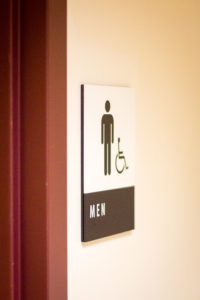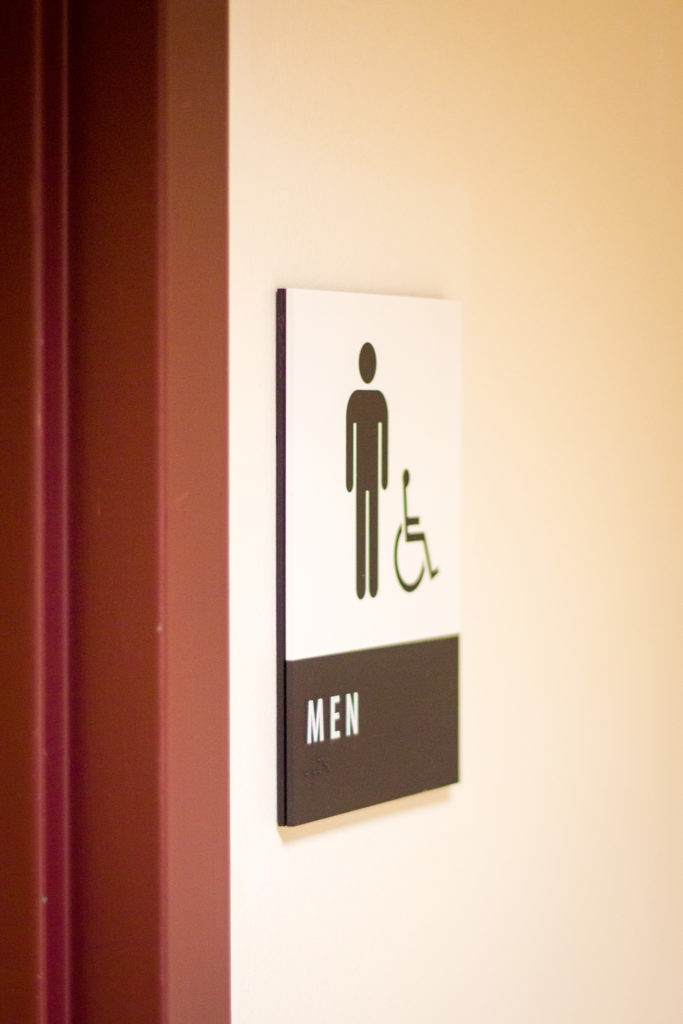
By Lily Bohlke
bohlkeli@grinnell.edu
Although many students are excited about the new free menstrual products in women’s bathrooms this semester, the same products have not made an appearance in male-gendered and single-occupancy bathrooms. Last September, Rebekah Rennick ’18 picked the locks of many tampon and pad machines across campus to demonstrate her belief that every student who menstruates, not just those who identify as women, should have access to free menstrual products.
“We have conversations about menstruation that are very woman-centric and are alienating to people who menstruate who don’t identify as women,” Rennick said. “For a college as socially progressive as we are, to not be aware or concerned with making this conversation inclusive is a problem.”
Last year’s Student Government Association (SGA) President, Dan Davis ’16, worked with both administration and Facilities Management (FM) to make free menstrual products available. Davis’ initiative called for the machines to be installed in female-gendered, male-gendered and single-occupancy bathrooms. FM verbally agreed to pay for the upkeep of the free machines if SGA and the College would pay for the installation.
When students returned to Grinnell in August, however, they found men’s bathrooms still absent of menstrual product machines. Pads and tampons also remain absent from single-occupancy bathrooms.
“Although we are open to providing such products in non-gendered, single-occupancy restrooms, it is atypical to do so, given the lesser volume of patrons and expense of the vending units,” Rick Whitney, assistant vice president for FM wrote in an email to The S&B.
For students with disabilities who may be more likely to use single-occupancy bathrooms, the absence of menstrual products in these bathrooms can prove to be a real issue of accessibility.
“We are so about accessibility,” said SGA President Anita DeWitt ’17. “Even making sure … that if you had a wheelchair you would still be able to reach up to grab that. Making sure that the thing you have to turn isn’t complex. Even if it just means baskets of tampons and pads.”
Although SGA will likely not put funding toward additional menstrual product machines, they plan to support any efforts to do so as best they can.
“Our job is to advocate for students, and that’s what we’re going to do going forward, [but] the money towards those things should come from the school,” DeWitt said.
Although Rennick is disappointed that free pad and tampons machines were not installed in all academic building bathrooms, she views the conversation around this issue as a sign of progress.
“If [there is] anything I’m happy that has come out of this besides for the implementation of free products, it’s that there is a dialogue,” Rennick said. “There is a conversation and we are actively in a space where we’re able to break the stigma and give people more connection to their bodies.”
According to Rennick, student support has also been very positive. However, after Rennick wrote an article for the Grinnell Underground Magazine, she did receive some backlash. She was told that fighting for such a small issue was “selfish or frivolous or silly.”
“It’s pretty weird to be called selfish and a profit of suburban strife, because this isn’t just something that affects people coming from places of privilege who have the time to be concerned about this,” she said. “This is something that affects people who don’t necessarily have the money to afford menstrual products. These are a real expense.”
DeWitt noted that although she thinks that menstrual products should have a comfortable space in all bathrooms, there are many logistics to think about. She explained that there are potential instances in which openly displayed pads and tampons may not be accepted. For example, she brought up a hypothetical cisgender heterosexual male who is not familiar with Grinnell’s culture. A person could become upset about seeing menstrual products in his bathroom and write a slur on the machine.
“That’s something we have to look for,” she said. “You have to think through every aspect of these things and how people are going to respond, and that’s where we are right now.”
Some universities have begun the movement towards menstrual products in all bathrooms, including male-gendered bathrooms. Brown University is a recent example DeWitt cited.
“I hope it can be moved forward and we can do more than what our peers institutions are doing,” Rennick said. “It’s more than just a women’s issue; it is a human issue.








































































